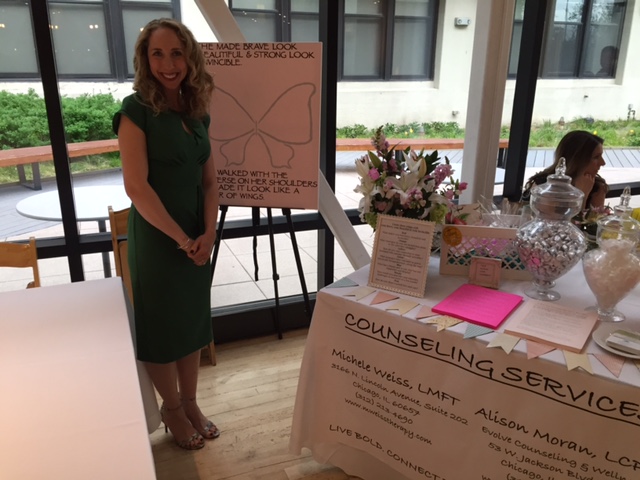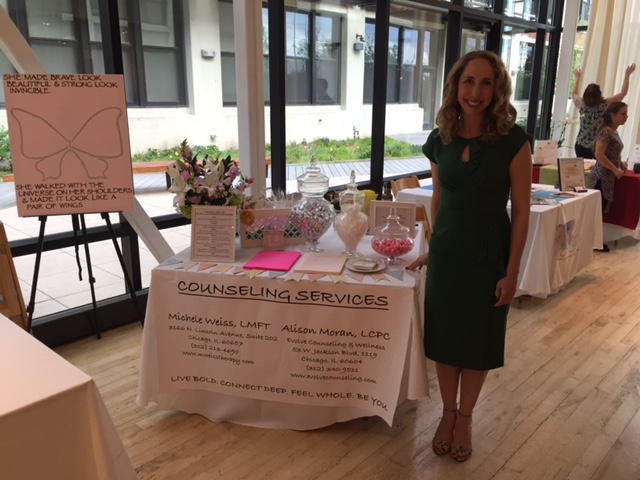In September 2017, I was honored to be interviewed by Katie O’Connor of Shine: A Light on Fertility. It was a wonderful opportunity to share about my mission to provide more comprehensive support services for women and couples dealing with infertility and perinatal mood disorders, as well as, to break social barriers. I talked about my love of chocolate and The Grateful Dead- and other fun facts about me. Enjoy!
Tell us a little about yourself and the mission of Michele Weiss, LMFT, Therapy.
I am a licensed marriage and family therapist with a private practice in Lakeview. While I have been seeing patients for 15 years, it was my personal experience with pregnancy loss and infertility treatment that lead me to specialize in working with infertility and perinatal mood disorders (ie: postpartum depression).
I found the infertility path to be one of isolation, overwhelm and often shame. Despite being poked, prodded and offered plenty of advice, the question, “how are you feeling about all of this?” rarely came up. My husband was completely on the fringes of the experience, even though he was feeling the heaviness of the loss and trauma, as well. With approximately 10% of the population going through infertility challenges, I realized that we need more support navigating the pain and struggle inherent in family-building challenges.
My mission is to offer women and couples emotional support, practical guidance and a space for ongoing connection and communication as they create and define their families. I want to help women feel more like themselves again, finding their “new normal”, when welcoming a new member into the family. I also feel strongly the need to break the barriers of silence and shame that continue to surround infertility and postpartum challenges. These struggles are too all-consuming and heartbreaking to suffer in silence or alone.
As part of my mission, I created a Women’s Health Professional Group for psychologists, advocates and educators in the field to connect and learn from each other. We meet quarterly with women’s reproductive health experts to be educated about the most cutting-edge research and support services (Thanks, Katie, for being a part of our great crew!).
What was the moment you knew you wanted to be a therapist?
I was working at Northwestern University with Parkinson’s Disease and Movement Disorders—on the road to becoming a doctor. I saw how these chronic conditions affected not only the patient, but also their partners and family members. I developed close relationships with some of the caregivers who shared with me about their deeper emotional struggles. I knew where my heart was landing. So, I went online (of course) and discovered a graduate program at Northwestern University in “Marriage and Family Therapy”. Who knew this was an actual field!? That was it for me.
What one post/project/moment are you the most proud of and why?
In 2016, I published an article on Kveller.com called “This is how I’m breaking my silence about my pregnancy loss.” I had never written a piece before. So, this was already a stretch for me. I had also never shared my story outside of my close family and friend network. But, I just had this niggling feeling that giving a voice to my loss might help others do the same.
The article spurred an outpouring of discussion about our pregnancy struggles, how to support each other, and a call for the stigma and shame around infertility to be lifted. I am still incredibly touched and honored to have been a part of this powerful moment and this strong band of women.
How would you describe a typical day? What’s your morning to evening routine?
I wish I could say that there was a “typical day”. But, my best days involve the ultimate self-care experience riding on a bike at SoulCycle; walking the streets of Lakeview with my yellow lab doggie; having meaningful and helpful sessions with patients; having a dance party with my kiddos; vegging out with my husband and enjoying a bowl of ice cream. Then, collapse. J
Describe yourself in 3 words?
Passionate. Curious. Sensitive.
What individuals, celebrities, entrepreneurs, public figures inspire you?
Michelle Obama, Helen Keller, Golda Meir.
The individuals who I meet in my office who display strength, depth, and heart that is nothing short of inspired.
If you weren’t in the therapy world…and could be anything else…what would it be?
That’s easy. You would find me on Southport or Armitage in my lovely “Make-Your-Own-Cookie” shop. Homemade dough, fresh cookies, espresso and lots of smiles.
You have a free hour, what do you do with your time?
I either rock out on a bike at SoulCycle or indulge in a chocolate chip scone at Bittersweet Café. Or both.
What’s on your music playlist? What inspires you?
I am a huge Phish and Grateful Dead “Head”. Though I am a hippie at heart, you will also find me singing along to Sara Barrielles, Simon and Garfunkel, and Wilco. With the occasional Rent and Hamilton thrown into the mix. I am deeply inspired by music and dancing—anything with a beautiful and unpredictable melody.
What’s your guilty pleasure?
I enjoy all things chocolate. And I don’t consider that pleasure, “guilty”.
Favorite local coffee shop?
Bittersweet Pastry Shop and Café is a little taste of heaven.
Food you can’t live without?
Chocolate. Peanut butter. Kale. In that order.
Wine, beer or cocktail?
There is nothing like clinking a glass of red wine with my husband and friends at the end of a full week.
Favorite motivational quote?
She made brave look beautiful & strong look invincible.
She walked with the universe on her shoulders & made it look like a pair of wings.
If you could go on vacation anywhere, where would you go?
Anywhere where there is sunshine, an ocean and people who I love.
What’s next for you?
There is only one reputable book that has been written about couple’s therapy and infertility. I dream of writing the second.
The “next, next” is my dream of creating an Institute in Lakeview, run by women, that is a collaborative effort in the infertility space. As more women and couples encounter these struggles, and as the science around infertility continues to evolve, this field is growing exponentially. My goal is to build a cohort of colleagues to address the growing needs of our community. I would feel extremely fortunate to be a part of creating an Institute that could shatter stigma, research and educate, and be a supportive network for individuals and couples. Stay tuned!



